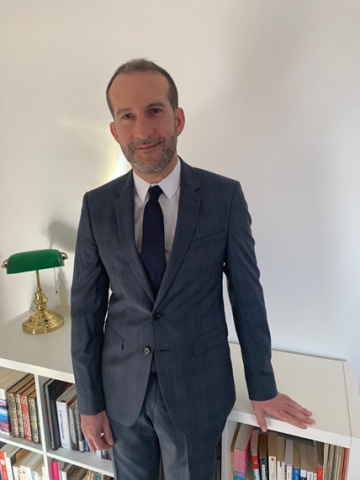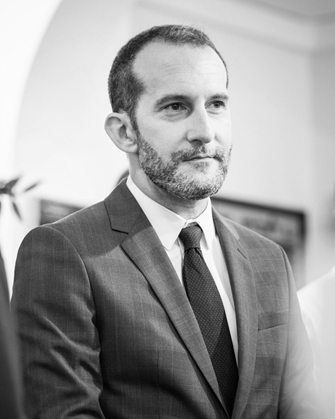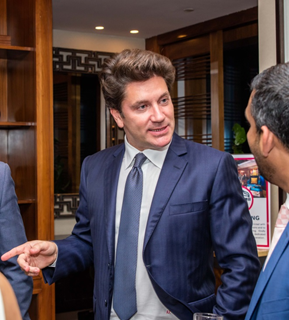Vivo Green, a new leading player in decarbonisation
Paris, November 2021 -- By Mark Philipps
Limiting global warming to 1.5°C, as reaffirmed during the COP 26, requires deep changes to our consumption habits and industrial production methods. For example, since the 1990s, French industries have reduced their greenhouse gas (GHG) emissions by nearly 46%, which represents 95% of the country's carbon footprint reduction effort, but this is partly due to the relocation of production outside the EU.

Jonathan Dery – President & Founder of Vivo Green - Paris Cop26
Climate change means physical risks, where the financial losses resulting from the severity and frequency of climate disruptions would weigh heavily on our economy. According to the IPCC (Intergovernmental Panel on Climate Change), climate change could cause a drop in global GDP of 1% to 4% in 2030 and 2% to 6% in 2050. While it is sometimes difficult to implement an effective and profitable change management strategy for our industries, investments are necessary to avoid the risk of transitioning to a +4°C planet. Indeed, the impact of a company on the climate is based on its carbon footprint, which quantifies the flow of GHG emitted each year.
As the G20 countries unveil their industrial recovery plans to revitalize an industry that respects climate issues, there are ways to achieve carbon neutrality through the compensation mechanism. This is the direction taken by Vivo Green, a French company founded in 2021 that positions itself as an intermediary between GHG-emitting industries and counterparties that implement low-carbon projects. According to Jonathan Dery, CEO of Vivo Green, "this dynamic towards the redesign of a low-carbon economic model represents a transition risk for companies with a significant carbon footprint and our support responds both to the constraints of companies with a high carbon footprint by encouraging them to produce ethically and within the norms while supporting low-carbon initiatives; this is the carbon neutrality to which we must all aim, without falling into angelism. This approach sums up the magnitude of the 21st century challenge.” Highlighted Jonathan Dery, Co-Founder and President.

According to Euler-Hermès, climate change-related regulations and the global effort to reduce greenhouse gas emissions will cost the energy sector alone nearly $1.4 trillion between 2010 and 2019. Another $6900 billion in infrastructure investments and $3500 billion in energy investments will be needed to complete the global low-carbon transition by 2030. In France, climate investments reached 48 billion euros in 2019, but according to the French think tank, I4CE (Institute For Climate Economics), this is still insufficient to meet national targets. To compensate the delay and put France back on the path to carbon neutrality, it would be necessary to invest around 15 billion euros more each year than in 2019 in the construction, transport and renewable energy sectors.
In addition to these investments, there is a reputational risk that must now encourage companies to be transparent and to anticipate their environmental and social constraints that have an impact on climate change. This is to be correlated with the ESG (Environmental Social Governance) commitments of companies in their economic development model by measuring the progress made in considering the impacts on the planet. Public and private actors are now obliged to make accessible the way in which their sustainable development imperatives are considered via the obligation to present a social and environmental report. This is a reflection that internally allows companies to assess the impact of their activity on climate change but also allows stakeholders to analyze the commitments and therefore the performance of the company in environmental matters. A better understanding of the future will require a detailed analysis of companies' carbon data and strategic thinking, involving employees, managers and stakeholders. This is where Vivo Green can help its customers to mature these thoughts.
Vivo Green: a player in sustainable development and decarbonization
Vivo Green was founded in 2021, a year of economic recovery after the COVID trauma of the past year. The company was founded by four partners and is headed by Jonathan Dery, who has over 15 years of experience in operational executive positions in the oil industry in West Africa and the Middle East. This graduate of the ESTP Paris and IFP School wanted to turn his international oil career around and use his experience to change the way the industry approaches energy efficiency as part of operational performance. According to him, "ecology and economy are the two legs necessary for the performance of companies and which feed themselves for the interest of all stakeholders, employees, customers and investors. The transition is behind us, energy savings do not necessarily have to be achieved through frugality but by rationalizing our needs through the development of practical and sustainable solutions.”

Vivo Green is the partner of companies with sustainable policies or who want to integrate this accelerating movement. Through its expertise, consulting activity, prescription of carbon credits and CEE (Energy Saving Certificates) and training for leaders in the conduct of "useful and sustainable change ", Vivo Green is committed to its customers in their adaptation to these new environments. Vivo Green's approach is to inspire its partners' projects to propel them into a sustainable, useful and pragmatic ecosystem by proposing a global reflection on the company and its stakeholders (sector, employees, managers, end customers and investors) by integrating them among the many solutions proposed by the public authorities (CEE, carbon credits and R&D subsidies) and also by providing quick, rational and inexpensive solutions.
Vivo Green supports companies and territories in the midst of ecological transition. Its support consists of an expertise in green change management for private companies and administrations. The company's performance must be driven by its initiatives and at no time should it be a constraint to undertake, develop or consolidate. The ecology of companies must necessarily remain a vector of performance for their core business.
Vivo Green aims to better identify the risks and thus highlight the potential positive externalities of a low-carbon economic model.
Vivo Green's approach is based on four pillars:
- Helping companies in legacy industries (the high carbon footprint companies) to project themselves into a low-carbon environment by preserving their teams and their historical activities whilst minimizing their impacts.
- Financially and technically support the actors of this change (counterparts) through different levers of subsidies and rational solutions.
- Integrate a sustainable approach fundamental to future performance.
- Promote and integrate the sustainable and useful dynamics through a policy of change management by training the stakeholders to transform this initiative into a reality of our daily lives (consumption and production habits).
Prescription of carbon credits and CEE
Within the framework of private initiative carbon offsetting and the CEE (Energy Saving Certificates) scheme, Vivo Green, manager of a portfolio of high footprint companies (obliged parties), offers exchanges of carbon credits or CEE in return for financial support (subsidies) for projects aimed at reducing GHGs or improving energy efficiency. Vivo Green's clients are public authorities and institutions, private landlords and property/asset managers, and industrial companies seeking to implement a pragmatic change policy.
Vivo Green acts as a prescriber between companies emitting CO2 (the obliged parties) or energy consumers and the beneficiaries of financial aid (the counterparts) to support them in a virtuous approach.
The grants are paid directly by Vivo Green in the form of bonuses in return for actions aimed at improving energy efficiency and reducing GHG emissions of its partners. For example, in France, it is possible to obtain a subsidy thanks to the CEE certificates that value energy efficiency work. Vivo Green establishes a preliminary diagnosis to estimate the amounts of these premiums to ensure a tailored financing for work to improve energy performance.
Decarbonization support
Vivo Green supports its private and public clients in the framework of an effective ecological transition. The main mission is to provide companies with operational tools for evaluation and control to reduce pollution while continuing to produce more, but also to guide towards greater energy efficiency by rationalizing costs with ecological solutions.
Vivo Green couples these tools with the aid and subsidy schemes dedicated to the green transformation of our economy.
Vivo Green's projects generate economic, environmental and therefore societal added value. The company assists its customers from the roadmap phase by optimizing the technical infrastructure, to the promotion of public support for the establishment of a financing plan.
Vivo Green also deploys all its know-how to share the dynamics of its customers with corporate stakeholders, internally and externally to create real low-carbon energy communities. Communication in change is one of the keys to success.
Alexandre Katrangi, Board Member and Founding Partner of Vivo Green says: "The challenge of a partnership with Vivo Green lies in securing the activities of our customers by grafting ESG solutions, thus transforming them into real development opportunities. It is through this vector that your relationships will be strengthened, and loyalty built both internally with your teams and externally with your customers ». Alexandre Katrangi, a specialist in geostrategy, has been one of the main advisors for France in the Middle East, notably concerning energy issues in Saudi Arabia and Bahrain. The partner has now returned to Europe and contributes to the business development of Vivo Green while seeking to meet a need: introduce sustainability and utility to the actions of large groups that he has advised for 25 years. His experience is used to integrate a green culture in the industry. "Energy production drives economic growth; the economy must now preserve this energy that is essential to any business in our societies."

Jonathan Dery insists that our entire ecosystem is concerned, from bank advisors to the managers of small and large companies, and that is why Vivo Green supports companies, institutions or any other organizations wishing to initiate a sustainable approach in their development model. With its training teams, Vivo Green assists its customers in the integration of a policy of change. Indeed, the regulatory framework is often far from the daily life of leaders and their management teams, which is why Vivo Green offers legal monitoring and training. One of its main missions is to present the issues related to a low-carbon economy, the regulations in force and the ethical issues related to decarbonization and energy efficiency.
To present your projects and benefit from Vivo Green's support to contribute to carbon neutrality: contact@vivo-green.fr
Company Name: Prysma Medias
Contact Person: Mark Philipps
Email: MP@prysmamedias.com.uk
Country: United Kingdom
Website: www.prysmamedias.com.uk

